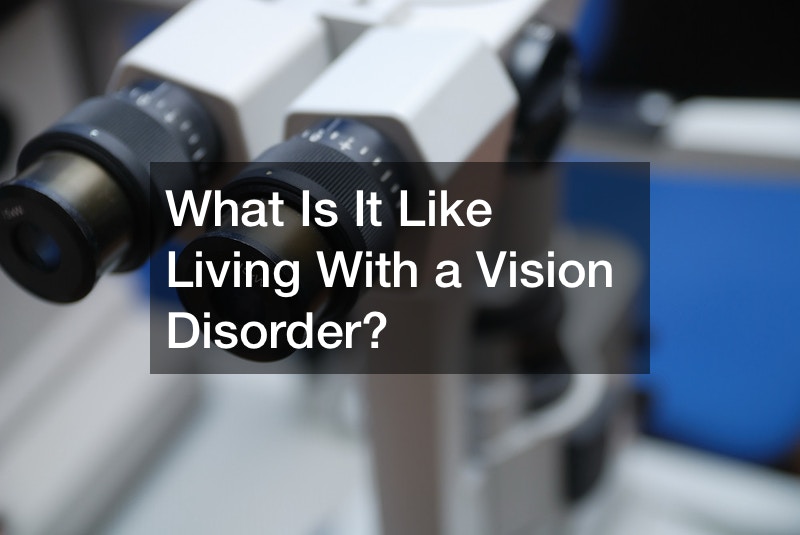
Having a low vision or any vision disorder can be life-changing. People diagnosed have already undergone various treatments and sometimes surgery to restore their once excellent eyesight. However, in some cases, it is not always possible. Therefore, it is important to adjust their current life to cope with their condition and make life easier in such instances. How is life impacted by a vision disorder?
It may be difficult to adapt with low vision, but with time, you will find that day-to-day activities become more manageable, and you can function just like an average person with great vision. If you are or you know someone living with a vision disorder, we have compiled some tips and tricks you can use to adjust to this new norm. Some helpful tips include:
What You Need to do When You Have a Vision Disorder

If your vision disorder was an accident, you need to get in touch with your personal injury attorney or even a disability law group to help you navigate the process and get your compensation. You can use the compensation to cover your medical bills or purchase visual aids. The attorney will be in charge of litigation and help you file a lawsuit. and answer the question of how is life impacted by a vision disorder.
Contact your Medicare advisor on insurance and how to go about the process of getting treatment. Vision disorders can be costly, and insurance can help you cover some of the expenses.
In another way of how is life impacted by a vision disorder, your ability to work or get a job will be greatly affected. You will therefore need social security disability insurance to cater for your basic needs. Your vision disorder could be severe, and you will need a means for survival as well as treatment.
Depending on your vision disorder, you can enlist companion care services for emotional support. Many people tend to fall into depression shortly after being diagnosed with a vision disorder, but with companionship, the burden becomes lighter. They also offer housekeeping services to help you get back on your feet and adapt to the new lifestyle.
Tips To Help You Cope Living with a Vision Disorder
If you have prescribed glasses, ensure you keep your lens up-to-date to avoid aggravating your vision further. Your eye doctor will guide you on the period you must keep your lenses and when to come in for a change.
Incorporate visual aids into your routine to help you do things faster. Things such as a magnifying glass should always be with you. They enlarge your prints and help improve your vision when reading or viewing something.
Seek the services of a counselor to help you cope with this new life. If you previously had a great vision and suddenly lost it, it can be challenging to do daily activities such as cooking, bathing, or shopping. Counseling and rehabilitation will help you adjust and train you on how is life impacted by a vision disorder and how to maneuver around.
Explore other out-of-the-box ways to facilitate your movement. If you were previously driving, you need to find new ways, such as carpooling, public transportation, or taxis. You can also consult your support groups or eye doctors whether they offer or know of any organizations offering transportation services for elderly and disabled.
Build a network of people to help you in your situation. It can be support groups of people facing the same disorder or your family and friends. Such relationships are impactful and improve your quality of life immensely and you do need that. You will need to make a few changes to your lifestyle depending on the severity of your vision disorder, your hobbies and your lifestyle. The transition can be long, tedious, and painful, but be patient as you try to regain your independence.
Changes You Need to Make to Adapt to Living with a Vision Disorder
List things you enjoy doing
Make changes to help you manage your daily activities
Incorporate low-vision aids and adaptive technology to enhance your vision.
Some of the critical areas you need to emphasize include:
Lighting

You will be surprised how is life impacted by a vision disorder when it comes to lighting. When your vision is poor, you need all the help you can get to focus on objects. You, therefore, need to:
Position lighting away from your eyes and directly on the subject
Add extra lighting in areas where your eyes cannot reach properly, such as floor lamps.
Use window coverings and various lighting fixtures to help you adjust the level of natural light needed at a particular time.
Properly light potential hazardous areas such as stairs and narrow corridors.
Contrast
Your ability to distinguish objects and their colors is another way of how is life impacted by a vision disorder. Low vision affects your ability to distinguish objects in their surroundings; hence you may need more light to help you contrast them. To help you distinguish objects, you need to: use light and dark colors to contrast regularly used items such as door frames. For instance, if the door is white, paint the frames in black or blue to help you distinguish the two. Place dark objects on a light background and vice versa for easier distinction.
Labeling And Marking
You will need a lot of labels and mark items to help you identify things faster. To guide you on labelling and marking, you need to: use bold colors for the labels and color-code if possible for foods, medicine, and spices. Use rubber bands to help you take medicine at the right time and help you keep track of your daily intake. You can mark your frequently used temperature settings on your oven so that you don’t have to set it every time you want to use it. You can use waterproof labels or stickers in your bathroom and kitchen to help you mark the level of water whenever you want to clean up. You can color-code your clothes and label them to help you find them easily and faster. When living with a vision disorder, your life becomes more prone to risks and potential hazards in your home. It is just another way of how is life impacted by a vision disorder. You need to take the necessary precautions to avoid potential hazards. Some of the precautions you need to take include:
Avoid Potential Hazards

If you previously had a carpet, you need to either remove it or tape it down. This way, you prevent toppling over the rug and falling down.
Avoid slippery floors. Bathrooms are common potential hazardous areas, so arrange to have your floors changed and use non-skid cleaners when cleaning.
Your electrical cables need to be safely tucked away from anywhere you regularly pass. Tape them down to avoid tripping over them and hurting yourself.
Keep your furniture in a way that does not block any entrance or exit. In addition, keep chairs pushed back at all times and drawers closed.
Do not keep your doors halfway open. You either close them or fully open them. Random doors closing can give anxiety disorders, especially in such a vulnerable condition.
Extend the handrails on staircases to ensure you don’t miss a step when going up or down the stairs.
Install motion sensors. If you are approaching a dark area, you need lights that sense motion and automatically switch on to help you see clearly where you are headed.
Using Visual Aids And Other Adaptive Technologies
Another way of how is life impacted by a vision disorder is the need to incorporate visual aids and adaptive technologies. You need assisted visual aids to use the existing vision and help you perform your duties normally. Some of the visual aids you need are:
Magnifying Lenses
These could be anything from reading glasses to hand-held magnifiers to help enlarge items. Some lenses come with in-built light for better visual quality.
Video enlargement systems
People with vision disorders also need to enjoy watching their favorite shows. Lack of televisions that aid their eyesight is just one of the ways life is impacted by a vision disorder, but with enhanced electronic systems, they can also enjoy viewing images and videos. The systems can come in the form of video cameras or a pair of large glasses that are easier to move around in and do not require special settings to the TV.
Tape Recorder For Record Keeping
You can speak important information onto a tape recorder and save it for later use instead of writing on paper. It is easier to listen than to struggle with reading.
Walking sticks. A walking stick can help you move around and detect any potential hazards around you. For instance, if you are taking a walk around your neighborhood, you may not be able to spot a hole or a puddle, but your walking stick can. This comes in handy in avoiding potential hazards. The walking stick also helps other people around you know that you are visually impaired by assisting you in crossing roads and directing you to disabled parking spots and washrooms. There are big changes and small changes in how lis life impacted by a vision disorder. Some of these changes can be costly, and others may take time before you fully adapt. Some will work for you and some won’t. The journey is long, but with time, things will fall into place. To help you adjust, some of the things you need to do include:
Stay Active

It can be a trying time living with a vision disorder, and you may even fall into depression. You may find it hard to sleep or do everyday chores. It is essential that you stay active for your health. Your doctor will recommend activities that you can take part in to help you remain active. Find fun ways to boost your mood and keep you energized. This way, you will adjust quickly to your new life.
Getting Support
With reduced vision, you will require a lot of support from loved ones. Relationships are an element in how is life impacted by a vision disorder. Some relationships will be tested, and you will end up losing some friends. However, this is not the time to sulk. There are many resources at your disposal to help you with the challenges of vision disorders. You can still lead a quality life despite the shortcomings. There are specialist groups, rehabilitation centers, and training agencies that help people with disabilities on a number of issues. They teach you how is life impacted by a vision disorder and ways to live with the disorder. From daycares for your children to supporting groups for house chores and many other activities, you are bound to find the help you need. Some of the specialists that can help you include:
- Counselors and rehabilitation specialists
- Special needs teachers for your children
- Low-vision specialists
- Psychiatrists
Adjusting to life after a vision disorder does not have to be challenging. The process may be long, but with baby steps, you are bound to make progress every day towards living a normal life. You do not have to be homebound or isolate yourself from the world. There are a lot of opportunities out there to help you get back on your feet. If you are finding it hard to find employment, you can learn about your condition and help others in a similar situation to cope. By encouraging them and helping them, you could easily have created physiatry jobs with all the information and experience you have gained. The main lesson here is that it does not always have to end badly. With a little bit of patience and endurance, living with a vision disorder can be normal.




